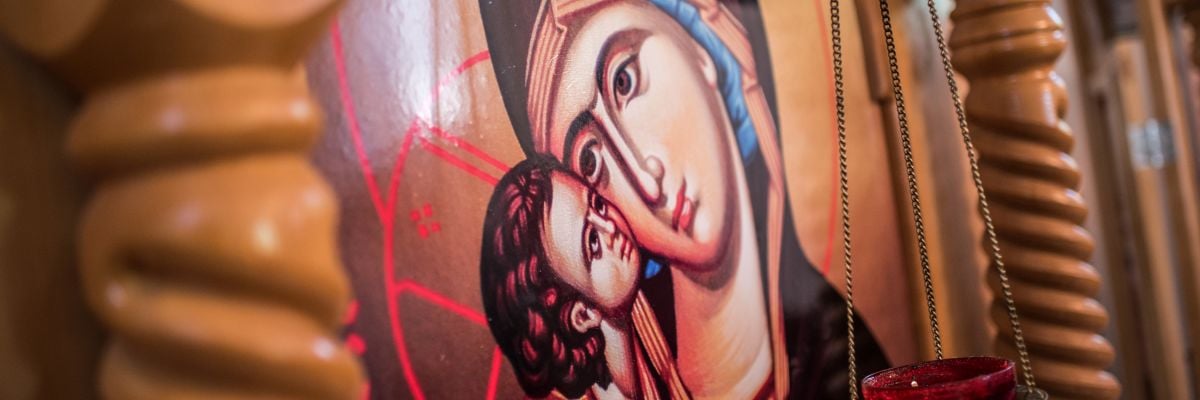
The most common objection I get to Mary as Mother of God, especially from Fundamentalists, but not limited to them, is, “The words ‘Mother of God’ are nowhere to be found in the Bible. Therefore, I will not accept it as true.”
This line of reasoning fails in dramatic fashion when carried to its logical conclusion when we consider the central mystery of the Christian Faith, the Trinity, is not found in Scripture verbatim as well. And we could go on. The Incarnation would fall by the wayside. Essential terms we use to do theology, like homoousios (Gr.—same nature, Jesus has the “same nature” as his Father), hypostatic union, the circumincessions of the persons of the Blessed Trinity, etc. All gone! The canon of Scripture, the nature of the sacrament of Holy Matrimony, and so much more we believe as Christians would be out the door because none of these things are made explicit in Scripture.
And this is not to mention “justification by faith alone.” Can anyone agree there is just a bit of irony in the fact that the same fellow who tells me he will not accept Mary as “Mother of God” because those words “are not found in the Bible,” will accept justification by faith alone when the only time those words are found in the Bible the words “not by” are right in front of them (cf. James 2:24)?
Positive Proof
Though we don’t have the words “Mother of God” as such in Scripture, we do have something very close in Luke 1:43, when Mary’s cousin (or relative) Elizabeth greets Mary shortly after she has conceived our Lord:
And why is this granted me, that the mother of my Lord should come to me?
Mother of the Lord means Mother of God, right? Isn’t Jesus our Lord and God?
“Not so fast,” so often says my Protestant interlocutor. “The Greek word kurios or ‘lord’ can indeed be used to denote divinity but not necessarily so. It can be used to denote an earthly potentate or even false ‘lords’ or gods” (see Matt. 20:8; 21:40; I Cor. 8:5-6, etc.). And this is true.
The key to our discussion then is to ascertain how kurios is being used of Christ in Luke 1:43. Was it being used to describe Jesus with regard to his humanity alone, or with regard to his divinity?
Old Testament Type
First, when Elizabeth “exclaimed with a loud cry… why is this granted me, that the mother of my Lord should come to me” (Luke 1:42-43), Mary was revealed to be the New Testament Ark of the Lord. Elizabeth’s words make this clear as they hearken back to a text from II Samuel 6:9 wherein David exclaims concerning the Old Covenant “ark of the Lord:”
And David was afraid of the LORD that day; and he said, “How can the ark of the LORD come to me?”
If this one parallel leaves you unconvinced, there are more that may tip the scale for you. St. John the Baptist “leaped for joy” at the salutation of Mary (Luke 1:44), just as King David “danced before the Lord” in the ark of the Lord in II Samuel 6:14. Moreover, Mary “remained with [Elizabeth] for three months (Luke 1:56),” just as “the ark of the Lord remained in the house of Obededom the Gittite for three months” in II Sam. 6:11.
Good enough for me.
The question is: Was the ark of the Covenant in the Old Testament the ark of an “earthly potentate,” or was it the ark of almighty God? The answer is obvious. If this is true, then the more glorious New Covenant Ark of the Covenant could never be said to be inferior to its antecedent. New Covenant fulfillments are always more glorious than their Old Covenant types (see Heb. 10:1; Col. 2:17; Heb. 8:6). Thus, the New Covenant “Ark of the Lord” could not be an ark of an earthly potentate, or a mere man. Given the revelation we have received from God, it—or she—is the Ark of Almighty God.
To Whom Did Mary Give Birth?
The second and most important reason we know Luke 1:43 is referring to Mary as the Mother of God is summed up nicely in the Catechism of the Catholic Church, paragraph 495:
Called in the Gospels “the mother of Jesus,” Mary is acclaimed by Elizabeth, at the prompting of the Spirit and even before the birth of her son, as “the mother of my Lord.” In fact, the One whom she conceived as man by the Holy Spirit, who truly became her Son according to the flesh, was none other than the Father’s eternal Son, the second person of the Holy Trinity. Hence the Church confesses that Mary is truly “Mother of God” (Theotokos).
Mary is the Mother of God precisely because Jesus Christ, her Son, is God. And when Mary gave birth, she did not give birth to a nature, or even two natures; she gave birth to one, divine person. To deny this essential truth of the faith, as the Council of Ephesus (AD 431) declared in its first of many “anathemas” of St. Cyril which would be accepted by the Council, is heresy:
If anyone does not confess that God is truly Emmanuel, and that on this account the Holy Virgin is the Mother of God (for according to the flesh she gave birth to the Word of God become flesh by birth), let him be anathema.
The real problem with denying Mary to be Mother of God and affirming her to be merely the mother of the man Christ Jesus is in doing so one invariably either denies the divinity of Christ (as the 4th century Arians did), or one creates two persons with regard to Jesus Christ (as the 5th century Nestorians did). Either error results in heresy. The Ecumenical Councils of Nicaea (AD 325) and Constantinople (AD 381) dealt decisively with the Arian heresy. The Council of Ephesus (AD 431), as mentioned above, dealt with this latter heresy as it was being taught by the followers of Patriarch Nestorius of Constantinople. Rather than teaching the truth that Christ is one divine person with two natures—one human, and one divine—hypostatically unified, or joined together without admixture in the one divine person of Christ, they were teaching Christ to be two persons with a mere moral union. The Council fathers understood this could never be affirmed by Christians. The Bible declares to us: “… in him the whole fullness of deity dwells bodily” (Colossians 2:9). And, “… in him all things were created, in heaven and on earth, visible and invisible…” (Colossians 1:16) No where do we read in them…
A Catholic Quadrinity?
Another common objection to Mary, Mother of God, goes something like this: “If God is Trinity, and Mary is the Mother of God, would that not mean Mary is the Mother of the Trinity?”
Actually, it does not.
Paragraph 495 of the Catechism, quoted above, was very clear that Mary is the mother of the second person of the Blessed Trinity because neither the Father nor the Holy Spirit were incarnate.
Simple enough.
But I am going to suggest the problem here to be deeper than just a confusion of persons within the Godhead. In my experience, this simple explanation almost invariably leads to another question that reveals the real problem in the mind of many Fundamentalists: “Even if Mary is only the Mother of the second person of the Blessed Trinity, he is just as eternal as the other two divine persons are. Thus, in order to be his mother, Mary would still have to be equally as eternal.” The root of the Quadrinity problem is really a false understanding of what is meant by Mary’s true motherhood and perhaps a false understanding of what is meant by motherhood in general.
By saying Mary is the Mother of God, the Catholic Church is not saying that Mary is the source of the divine nature among the three persons of the Blessed Trinity, nor is she the source of the divine nature of the second person of the Blessed Trinity. She doesn’t have to be in order to be the mother of the second person of the Blessed Trinity incarnate.
Perhaps an analogy using normal human reproduction will help clarify the Catholic and biblical position. My wife is the mother of my son, Timmy (and four other little human tornadoes). But this in no way implies that she is the source of Timmy’s immortal soul. God directly and immediately created his soul as he does with every human being (see Eccl. 12:7). However, we do not conclude from this that my wife, Valerie, is merely “the mother of Timmy’s body.” She is Timmy’s mother… period. This is so because she did not give birth to a body. She gave birth to a human person who is a body/soul composite… Timmy.
Analogously, though Mary did not provide Jesus with either his divine nature or his immortal human soul, she is still his mother because she did not give birth to a body, a soul, a nature, or even two natures—she gave birth to a person. And that one person is God. The conclusion to the whole matter is inescapable: If Jesus Christ is one, eternal and unchangeable divine person—God—and Mary is his mother—then Mary is the Mother of that one, eternal and unchangeable person—God.



